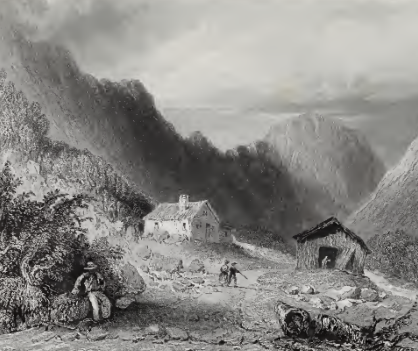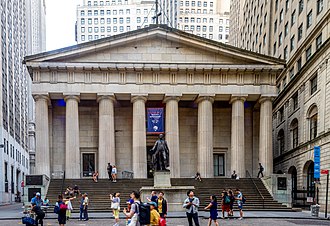Thanks are due to Mike Zuckerman for his response to my series on the American Revolution Reborn conference which he organized. I appreciate his having read an unsolicited essay from a stranger whom he just met, for our extended email exchange, and for his contributing a post to New York History on this topic.
If I may, I would like to respond to his comments by separating them into two types: those that addressed the conference itself and those that refer to the more general question of America’s identity.
I argued that scholars at the conference failed to express pride in the American Revolution. He wondered if we attended the same conference. We did not. Yes, we were in the same room, at the same time, hearing the same papers and comments. Still, we were not at the same conference. The difference is that he knows these scholars personally, and I know them only as scholars.
They have broken bread, shared panels, discussed the issues of the day. I know them only by what was printed and presented. I’m like a scholar trying to understand people of the past from their official records, without knowing them personally. When it comes to the personal values, ideals, and hopes of the participants of the American Revolution Reborn conference, I must defer to those who knows them personally. As an outside spectator considering the record however, I have the deer-in-the-headlight image of Harvard University’s Laurel Thatcher Ulrich to remember.
Mike Zuckerman mentions that besides Ulrich, I also might have included Obama, Bush, Clinton and Reagan as people who have embarrassed themselves with American exceptionalism. However, the topic of the conference wasn’t recent presidents in American history and their attitude towards American exceptionalism. The question to Ulrich and her panelists was about the American Revolution. To say that it was a good thing in and of itself says nothing about exceptionalism. There is no direct line between the two. Perhaps part of the problem and exaggerated sensitivity of the scholars present was the fear that if one said that the American Revolution was a good thing it would be the equivalent of endorsing the actions of Obama, Bush, Clinton, and Reagan, too.
The point I hoped to make, but apparently didn’t quite succeed, is that the phrase “my country right or wrong” means acknowledging one’s country can be wrong. If the eyes of the world are upon us, then we have an obligation to live up to our ideals.
How to do so effectively is the challenge.
If the new master narrative gives the appearance of being anti-American, then it will be rejected. If it is presented by people who have pride in being American and who are not always apologizing for it, then it has a better chance of resonating with the American people.
How do scholars “market” themselves in the public arena so their image is positive, and not apologetic anti-American? If scholars seek a call to (political) arms as Mike Zuckerman seems to suggest, then those issuing the call need to do so as prophets who want America to live up to its ideals and oppose the wealthy, powerful, and the loudly ignorant.
If however, the language of academics today is condescending, doesn’t take pride in the American Revolution, and only criticizes America, then Mike Zuckerman is right: the battle over the changes America needs to live up to its potential is lost.
There is a difference between challenging America to be great and simply constantly condemning it for its shortcomings. Academics haven’t learned to speak the language of patriotism when criticizing America. They should champion the journey the Founding Fathers began, rather than only criticizing them for failing to meet their 21st century moral standards.
Yes, the American Revolution was a good thing, but we can’t rest on our laurels.
Yes the American Revolution was a good thing, but there is more that needs to be done.
Yes, the American Revolution was a good thing, and with your help the journey the Founding Fathers began can be renewed for the 21st century.






Hmmm. Scholarship is not about making judgments; to paraphrase Lou Reed, it should be neither for or against, but about. I think you have a false premise that either patriotism or revisionism is an expressive goal. I would quote Dr. Johnson on the subject but I suspect that would be beside the point.
Peter,
I see a number of recognizable forces at play here.
1) In previous posts you discuss the idea of teaching the American Revolution as a way of preparing young people for the duties of being a U.S. citizen. The High School textbook version of the American Revolution glorifies the American Revolution and the founding fathers to demonstrate the ideals of our nation, life before our Constitutional liberties and our role in governing our nation as a democracy. However, I contend that secondary education institutions and the academics that staff them should instill a healthy skepticism of our government that encourages young people to question their leaders, have an open mind and to make decisions about the issues. If the Constitution was meant to be a “living document” then this type of education is necessary for progress to be made. The audience is a big part of what differentiates academic history from public history, which is probably why you don’t hear many museums dedicated to the loyalist of the American Revolution.
2) Some academics strive to draw far-reaching conclusions that cannot successfully be proved or disproved in the hopes that evidence in the future will verify their argument, making them a pioneer in the field. This hurts us more then helps us as a field of study, particularly in the area of Public History.
3) Matt Wall worded better than I could above.
I thank you for your posts Peter and your continued dialogue about prevalent issues within the history field
I applaud the substance, tone and self-awareness of this review. Academia’s hostility toward the rhetoric and notion of American exceptionalism, and the faddishness and intolerance for diversity of viewpoints that accompanies it, is in serious need of revision. No one expects academics to be a unified amen choir for American actions and history – but as a group they tend to have a bias that has – it appears – contributed to the declining interest in History as a college major. Many aspects of our past are not affirmational. But its still joyful and rewarding to find aspects that are. We need both. Alas, its pretty clear that Gordon Wood could never get tenure today and I suppose David McCullough is scorned in the inner sanctums.